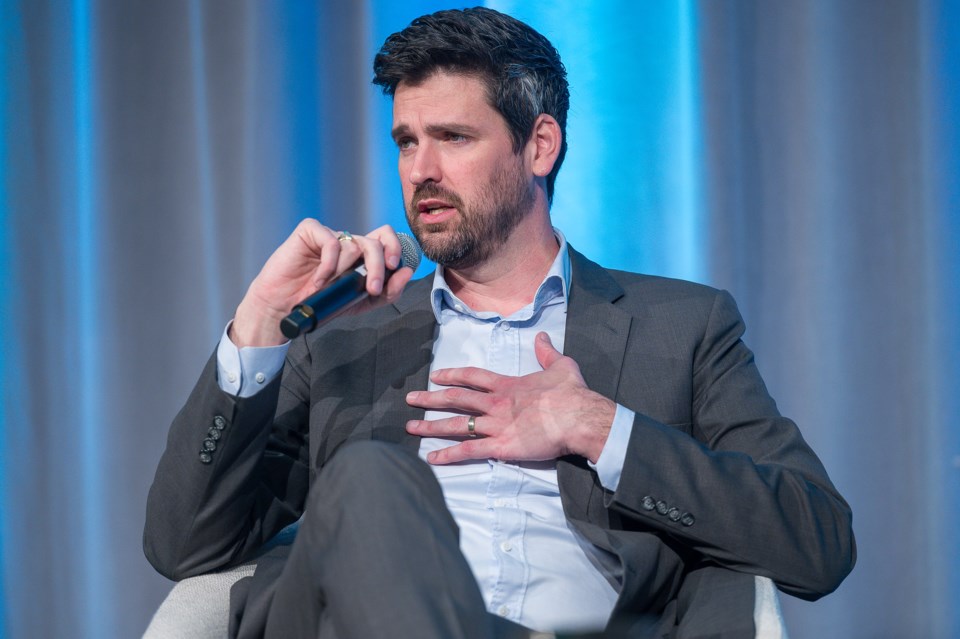Efforts to quell B.C. municipal leaders’ anxieties over funding local infrastructure were greeted with open arms at a housing conference in Vancouver Wednesday.
But federal Housing Minister Sean Fraser was only able to offer up a hypothetical funding model in response to fears over how to pay for housing growth.
“As we develop programs in the short-term to continue to support the infrastructure that will allow for housing growth, I think we need to revisit how communities receive funding at a municipal level in this country,” Fraser said in a question-and-answer period that wrapped up the two-day Union of BC Municipalities (UBCM) 2024 Housing Summit.
While he did not elaborate on what this new funding would look like, the federal minister said he is open to new and creative ideas.
Local leaders voice their frustration
Much of the week’s UBCM programming was aimed at helping municipalities navigate provincial housing legislation introduced this past November as well as help local government figure out how to accommodate the province’s growing population.
“The infrastructure piece, I think is really key. And I'm really hopeful that the province has heard that message,” Victoria Mayor Marianne Alto said in a panel discussion Tuesday.
Burnaby Mayor Mike Hurley and Richmond Mayor Malcolm Brodie both said that new legislation allowing for the construction of four to six units on single-family lots will exacerbate the infrastructure capacity in those neighbourhoods.
“I'm talking about very basic infrastructure like pipes in the ground. Do your toilets work when you flush?” said Hurley. “Those are all the things that most people don't think about and haven’t been thought about before these plans were brought out.”
Both the Richmond and Burnaby mayors said they are focusing growth around town centres and transit nodes.
In a panel discussion Wednesday, Port Coquitlam Mayor Brad West said that there needs to be consistent funding for transit to create the density that the province wants as part of its transit-oriented development bill.
“For many decades, the can has been kicked down the road over and over again, in terms of finding a funding model that's going to deliver the transit services that people in our region need. We have run out of road to kick the can down,” said West.
“You want to have transit-oriented development? Wonderful. You need to have a proper transit system.”
Transit ridership in Vancouver is ranked as the fourth busiest among North American cities, with an 85 per cent post-pandemic recovery, according to a January report from Jones Lang LaSalle IP Inc.
“Demand for public transit in Surrey and Langley has soared to 120 per cent of pre-pandemic levels. In these rapidly growing communities, some routes have seen a staggering increase in ridership, more than doubling in the past four years,” said the real estate services firm’s report.
The Liberal government increased annual immigration targets in 2022 and aims to welcome 500,000 immigrants in both 2025 and 2026.
“The federal government is completely MIA from this discussion and that is incredibly irresponsible given that it's their decisions that are driving so much of what we're grappling with,” said West.
Hurley said that discussions around transit-oriented development need to be paired with talks about transit funding, with the risk being that “all these housing strategies go out the window.”
Consistent, reliable streams of funding needed
Fraser took questions from local leaders during a Wednesday session at the UBCM conference.
When asked by Penticton Mayor Julius Bloomfield if the federal government is considering new ways of providing long-term consistent funding, the federal minister replied, “yes, in part.”
Fraser said that there is already a consistent stream of funding through the Canada Community Building Fund (CCBF), previously known as the Gas Tax.
CCBF is a permanent source of funding provided twice a year to provinces and territories that pass this on to their municipalities to support local infrastructure.
“That's going to remain in place, though we are working to make certain changes to it to make sure we get additional social outcomes that we want to see,” said Fraser.
He also mentioned the Disaster Mitigation and Adaption Fund and Active Transportation Fund, which target different types of infrastructure.
“I think we can come to an agreement on what the long-term plans for a different funding model should be, where municipalities have a more consistent and predictable source of revenue and beyond what they can squeeze into property taxes,” Fraser said.
The federal government is working with the Federation of Canadian Municipalities (FCM) to “understand their pitch on a municipal growth framework,” Fraser told media on Wednesday at the conference.
“That's not done. That is not official government policy, but it's a place that we're looking to explore further.”
However, he emphasized that this must make financial sense for the federal government.
“I do want to make sure that the federal government is seeing a return on investment. I don't want to be in a position where we cut a cheque and have no understanding of what it's going toward,” he said.



